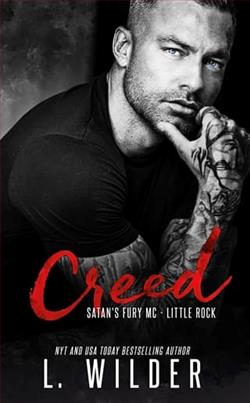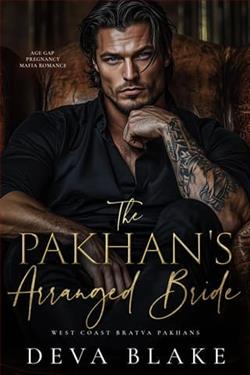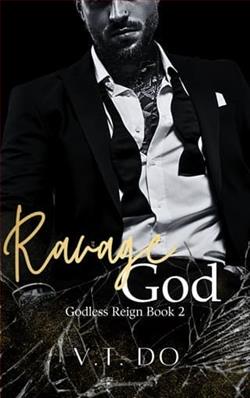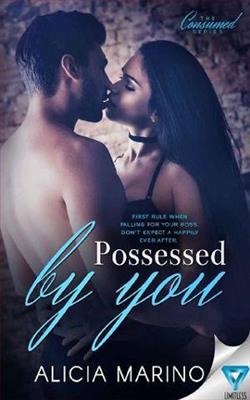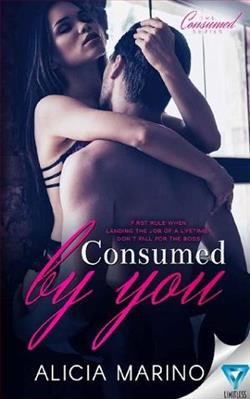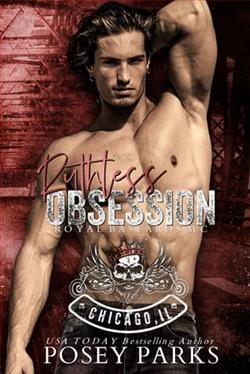Page 18 of A Storybook Wedding
Returning to campus the next morning feels like a weird van ride of shame. I think it has something to do with Maggie. Today, she’s wearing a neon purple tank top that claims I Love Me Some WAP with a picture of Tolstoy’s War and Peace below it. (One really has to wonder if she knows what WAP stands for or if this is just a fluke.) She smiles at all of us as we file into the van, and when it’s Nate’s turn to climb inside, she touches his arm and says, “Come, love. Sit shotgun next to me.” He politely declines with a shake of his head, and Maggie shrugs, walks around to the driver’s side, and sulks in her seat until everyone is safely on board. Meanwhile, all of the not-quite-one-hundred-percent-better-yet passengers had to endure many rounds of puking last night without brushing our teeth afterward, so I can’t speak for the others, but I opt to keep my mouth shut so nobody is subjected to my rank morning breath.
Thankfully, Maggie doesn’t drive like a maniac this time. She does, however, seem much quieter than the last time we were here together. To fill the void, she puts on the radio, and suddenly the van is overcome with the Jamaican dancehall stylings of one Mad Cobra circa 1992, whose one-hit wonder is marked by the refrain, “Gyal, flex. Time to have sex.” As if we were in need of a reggae-based alarm clock. Perhaps it’s not exactly what you or I might select at 7:30 in the morning after a stay in an infirmary, but I’m starting to think that this is definitely an on-brand move for Maggie.
Physically, I feel about eighty-five percent better, but emotionally, I somehow feel significantly lighter this morning, like the heavy weight of loneliness and feeling like I don’t belong that was crushing my shoulders is noticeably absent today. I woke up before Profes—um, Nate, and I worried for a split second that he would regret talking to me last night, like when you meet a guy when you’re tipsy in a dark bar and then see him sober in the light of day and you’re like, Wow…no.
But that’s not how it goes down at all. When we woke up, he smiled at me, his hair all askew, and we exchanged very few words other than his “How are you feeling?” and my “A little better. You?” which was followed by a nod, a grunt, and the word “Same.” We’re side by side in the back of the van, but I’m staring out the back window at the scenery, which I must admit is quite bucolic, especially in the early morning peachy glow of the sun. He’s checking his phone. If we were friends, I would say, “Look! You’re missing it.” But we’re just—I don’t know. Teacher and student, I guess.
When we arrive at the retreat center, I wave goodbye to Nate and to Maggie and immediately head to the shower. I stave off a warm welcome from Gurt, who is thankfully absent from our room when I arrive, and who (by some miracle of God) has not removed all of my personal belongings and changed the locks while I was gone. I luxuriate in one of the vertical coffins masquerading as a shower in the communal restroom, scrub the enamel off my teeth over the sink for a solid five minutes, and slip on a sundress with a light cardigan over it. I tie my wet hair in a topknot and decide to skip the makeup for today, seeing as how there’s no way I could look more haggard than I did last night. Clean is the goal, I decide. Just be clean and healthy, and keep all your food down.
With my backpack in tow, I head to the dining hall and make myself a toasted English muffin for breakfast. Dry. It’s about all my stomach can handle. I sit through Nate’s workshop. Today, we are reviewing Trite Tim’s work: the first eighteen pages of a novel that is supposed to be a modern-day take on George Orwell’s Animal Farm, only in his version, a hamster and a guinea pig try to take over a Petco, and there’s nothing to be found but entirely unrealistic action scenes that Tim insists are allegorical. I’m reminded of Humphrey, the hamster from the series by the same name that is quite popular with the third and fourth graders at the library, and even though I say very little out loud in our workshop together, I laugh as I remember the fact that I offered this up as a book recommendation in my feedback letter to Tim.
It’s so tempting to cut him down, but I’m exhausted, and I remind myself that’s not what I came here for anyway. Nate manages to give him a good dose of thoughtful feedback, Harold persists with the stroking of his imperceivable facial hair (the cape is blessedly absent from his outfit today), and Maleficent expresses her discontent for stories in which humans are not the main characters. We break for a snack, and while Tim is clearly pissed, at least he’s not crying, so I’m pretty sure Nate sees that as a win.
Later that afternoon, I’m settling into a chair in Room B of the North Wind building, readying myself for Nate’s seminar. I feel a little bit better, although the occasional errant burp reminds me of last night’s debacle and the fact that I will never eat shellfish again. The room is packed. Apparently, everyone’s really excited to hear Nate speak.
I wouldn’t have classified Nate Ellis as a nervous sort of person prior to my conversation with him last night. Descriptors for him might have included words like egotistical, narcissistic, or perhaps even holier-than-thou. Now, I feel like he’s a lot more regular that I previously realized; he’s maybe just a little better at navigating social situations that I am. (Fine, significantly better.) There’s something about accolades in the literary world that create unfair assumptions. I mean, between his prestigious award and his Yaddo stint, he’s an easy person to be jealous of. And to be fair, his writing isn’t half-bad. His book just struck me as a little bit reminiscent of Death of a Salesman, if it was set in the aftermath of a pandemic and Willy Loman was replaced by a Department of Labor employee. It wasn’t bad. I just wouldn’t choose it off a shelf in Barnes & Noble is all I’m saying.
I’m not rude about it though. I’m not shouting from the rooftops that I wouldn’t curl up with Work on a Saturday night.
But apparently, I’m very naïve. I’ve brought an expectation with me to this school that faculty members will be collegial toward one another and that they are as invested in each other’s success as they are in their students’ learning. So forgive me for not expecting what happens next.
“Good afternoon, everyone,” Nate begins. “We’re here today to discuss the way in which plot affects character development in literature.” He starts up a PowerPoint presentation using the clicker that Lucy has provided him with. The first few slides offer examples, along with references to short stories that we were expected to read in advance of the seminar. All of these items are neatly printed out in my binder, and I follow along with the Nate Ellis Show without concern.
Until.
“I’d like us to take a few moments here to do a generative exercise. Everyone, please take out a notebook or an iPad. Whatever you’ve got.” He switches the slide and begins to read the assignment aloud. “This exercise is called ‘Put Yourself in the Story.’ Essentially, I want you to think of yourself as the main character in a novel or piece of short fiction. Think of a moment—a real moment from your own personal biography—that you feel shifted your outlook on life or on the world around you. Write that moment for us. And when we’re done, I’ll take a few minutes and give people a chance to share.”
I begin to ruminate on the question, knowing full well exactly which moment it was that altered the trajectory of my life—but my train of thought is interrupted by someone.
“Excuse me, Mr. Ellis. What makes you think that this exercise is relevant? I can think of a number of famous stories where the plot has nothing to do with the character’s internal arc. In fact, the arc happens despite the plot. I’d say we can all agree that this is a critical element of what sets literary fiction apart from genre fiction, hm?”
I swivel around to see that the demeaning voice belongs to that woman from the mixer the other day, the one who made the comment about Nate and Yaddo. Alice Some-French-Last-Name-That-Probably-Means-Fuck-Tart.
“I’m sorry?” he asks.
She clears her throat and repeats her insult using a different set of SAT prep words.
“Well, if we disregard plot as an essential element of storytelling, we’re left with very little, Professor Devereaux,” he rebuts. “And I happen to have it on good authority that not every student in our program is writing literary fiction.”
She harrumphs, openly sneering at him. “You certainly weren’t.”
He laughs off the obvious insult, but I can feel the tension mounting. “You’re right. Like many of the artists here, I came to the page without a clear plan for what I was going to write. I think you’re missing the point of the exercise though. The point of the exercise is to take a deeper look at plot as a device to create change and move the needle for a protagonist. They say, ‘Write what you know,’ so I’m here offering our students that opportunity.”
Dillon Norway stands up. “It’s an interesting conversation, one that often persists in the MFA world: literary versus commercial fiction. There’s no right or wrong though. There’s plenty of space for both. So let’s get on with the exercise then. What’d you say, Nate? Ten minutes? Fifteen?”
“Fifteen minutes should work,” he agrees and then turns to shuffle some handouts as the room goes quiet with the white noise of pens scribbling on paper and tablet screens.
I can’t help but notice the slump in Nate’s shoulders as he busies himself with anything to keep his back turned to the audience. Alice Douchebag Devereaux receives a silent tap on the shoulder from Dillon Norway, who juts out his chin toward the door, mutely requesting that she follow him outside, which she does, but not without a puss on her face.
Thoughts of Alice Devereaux’s obvious frigidity sadly translate into the story I’m about to jot down about myself, causing me no small amount of panic at the thought of a sexless, judgmental future not unlike the one she must be experiencing presently. But I am not a bitter person, I remind myself. In fact, my story is actually quite hopeful.
So I write.
You know the whole Always a bridesmaid, never a bride thing? Well, that’s kind of been my personal tagline for the past nine years. I’ve been in thirteen weddings. That’s thirteen bridal showers I’ve had to help plan, thirteen bachelorette parties I’ve tried (and failed) to enjoy, thirteen awkward nights out in uncomfortable shoes doing the Cha Cha Slide with my nieces while my adoring aunts drink themselves giggly and post wastey-pants videos of their synchronized dance attempts on TikTok. Now I’m sure you’re thinking that the reason I’ve been involved in so many weddings must be on account of my sparkling personality. (She’s awash with friends! you presume. Ha, I respond; if only that were the case.) I actually come from a gigantic family. Three sisters. Twelve cousins. All girls. All of whom I love dearly! And all of prime childbearing age, raised by a quartet of women from the easternmost New York City outer borough.
The estrogen in our bloodline is next level.
We must put out some serious pheromones too, because all thirteen of the weddings in question happened before the brides turned thirty. We’re not living in Little House on the Prairie times either, where girls had kids by eighteen and were dead by fifty. This story takes place now, not hundreds of years ago.









